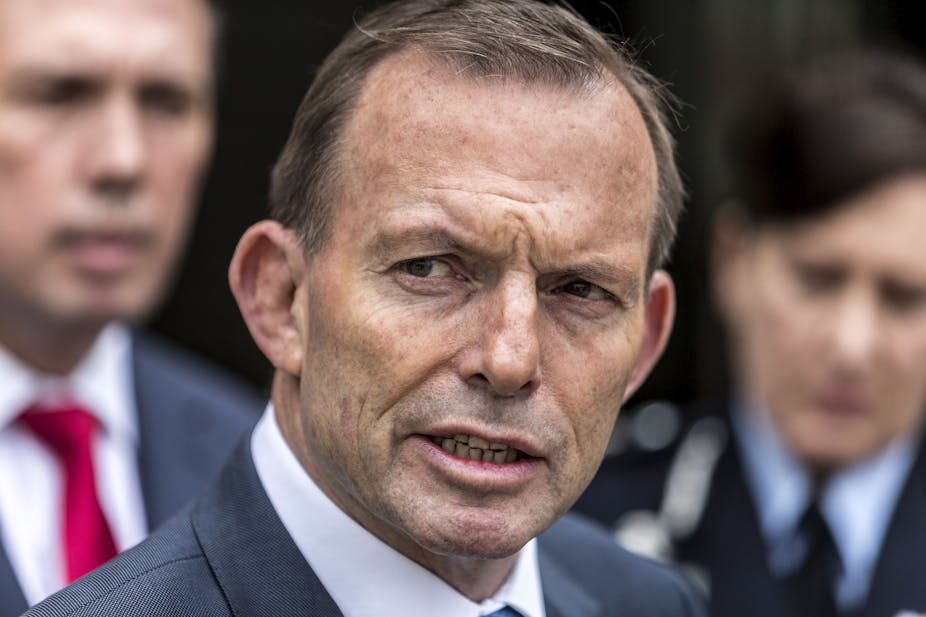Labor has extended its lead and Bill Shorten has improved his position vis-a-vis Tony Abbott in the latest polling blow to the government, putting further pressure on the prime minister.
The Coalition trails 46% (down one point since July) to Labor’s 54% (up one point) on the two-party vote in the Fairfax-Ipsos poll.
The results, which reflect Newspoll a week ago which also showed a 54-46% Labor lead, come as Abbott struggles to deal with a ministry publicly divided on how to go forward in dealing with the issue of same-sex marriage and fresh questions about his leadership.
Shorten’s net approval has risen ten points since the July poll and stands at minus ten.
Malcolm Turnbull has widened his lead over Abbott as preferred Liberal leader and prime minister since late February, just weeks after Abbott held off a spill motion. Turnbull is preferred by 41%, up two points, while Abbott is preferred only by 15%, down four points.
The ALP’s primary vote has risen one point to 36%, while the Coalition is down on primaries one point to 38%. The Greens remain on 16% in the poll, which comes in the wake of the controversy over the entitlements claims of Bronwyn Bishop – who was forced to resign the speakership – and other politicians, and the argument within the Coalition over same-sex marriage.
The polling of 1402 people, taken Thursday to Saturday, also came as a row erupted over Dyson Heydon, the royal commissioner who is examining trade union corruption, accepting an invitation to deliver a lecture sponsored by the Liberal Party. Last week he withdrew from the function.
Bill Shorten has widened his lead as preferred prime minister. 45% would prefer Shorten, up two points, while Abbott’s rating is unchanged at 39%.
Abbott’s approval is down one point to 35%; his disapproval remains at 59%. His net approval is minus 24%, down one point since July.
Shorten has climbed again from the knock he took in the poll taken just before his appearance at the royal commission on July 8, with his approval rising four points since the July poll to 39%, and his disapproval falling six points.
As preferred Liberal leader, Julie Bishop has fallen one point since February to 23%.
Scott Morrison, who is being increasingly talked about in political circles as a possible leader, remains hardly on the radar for voters, rating 5%, up one point since July. Joe Hockey, who is no longer seen as a possibility if there was a leadership change, is also on 5%.
Among Coalition voters Abbott outranks Turnbull – 33% (down five) to 25% (down five). Bishop is on 23 (up two), Hockey rates 6% (up two) while Morrison has doubled his support to 8% since February.
Shorten and his deputy Tanya Plibersek are nearly neck-and-neck as preferred Labor leader, with Shorten on 25% (down four points since February) and Plibersek on 23% (up four). Anthony Albanese, who lost to Shorten in the post-election leadership ballot, has risen three points to 19% as preferred Labor leader.
Among Labor voters, Shorten enjoys a clearer though declining lead over Plibersek – 34% (down nine) to 24% (up three).
The poll also finds a majority of voters – 58% - think the government has done too little to address climate change. About one-third – 32% - believe what it has done is about right, according to the Fairfax-Ipsos poll.
Only 7% say it has done too much. The results show little variation from when the issue was measured in December.
The results come after last week’s announcements of Australia’s target for the Paris climate conference late this year. The government’s proposed emissions reduction for post-2020 is 26-28% on 2005 levels by 2030.
People were not asked directly about the target but a more general question: “Do you think the federal government’s measures to address climate change are too much, too little, or about right?”
There were big differences when the results were broken down by vote: 32% of Coalition voters said the government had done too little, while 73% of ALP voters and 88% of Green voters said it had.

